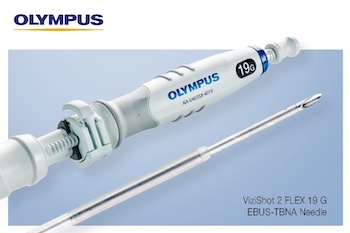Tissue samples collected with the largest gauge needle currently on the market led to successful rates in molecular biomarker testing
CENTER VALLEY, Pa., (Sept. 2, 2021) – Olympus announced today the results of a pilot study showing the safety and effectiveness of the ViziShot 2 FLEX 19 G EBUS-TBNA Needle in gathering tissue samples critical to guiding treatment of non-small cell lung cancer (NSCLC).
“We are very pleased to see the results showing the 19-G has a high success rate in testing for molecular markers and immune checkpoint inhibitor targets” said Lynn Ray, Vice President and General Manager of the Global Respiratory Business Unit for Olympus Corporation. “Samples with a high number of tumor cells gives the pathology team more to work with, which helps the oncology team make a timely diagnosis and gives them the information needed to provide personalized, targeted lung cancer treatment.”
The development of targeted therapies for advanced stages of lung cancer makes collecting adequate tissue samples a priority to assure all molecular marker tests can be completed. Mutations with implications for treatment of NSCLC include epidermal growth factor receptor (EGFR), anaplastic lymphoma kinase (ALK) and c-ros oncogene 1 (ROS-1). Immunotherapy treatment also targets inhibition of the cell death receptor (PD-1) or its ligand (PD-L1).
The study showed that fine needle biopsy samples taken using the Olympus ViziShot 2 FLEX 19 G EBUS-TBNA Needle, the largest gauge needle on the market today, provided ample amounts of tissue, leading to a high success rate in molecular marker and PD-L1 testing. Fifty-eight percent of the specimens collected contained more than 500 malignant cells and 22% had 200 to 500 malignant cells. Success rates for the marker testing stood at 90% for PD-L1 and EGFR and 86% for ALK.
EBUS-TBNA (Endobronchial Ultrasound-guided Transbronchial Needle Aspiration) is a procedure used in the diagnosis and staging of lung cancer, allowing physicians to visualize diseased tissue, lymph nodes or lesions beyond the walls of the airways. Samples from parts of the lymph node that require further investigation can be taken using a specialized needle. The procedure has proved a less invasive and cost-effective method to diagnose and stage lung cancer.
Historically, 21- and 22-G needles have been used for the EBUS-TBNA procedure. This study evaluated the performance of the larger 19-G needle, which represents a 72% increase in inner surface over the 21-G needle and 144% increase over the 22-G. The study found that the 19-G needle provides a larger sample and enough tissue for molecular biomarker testing, potentially leading to more targeted therapy for the patient.
The study also showed no adverse effects on tissue analysis because of blood contamination and no additional traumas compared to the smaller needles.

Dr. Momen Wahidi led the study titled, “Pilot Study of the Performance of 19-G Needle in Endobronchial Ultrasound-guided Transbronchial Aspiration for the Diagnosis and Testing of Molecular Markers in Lung Cancer,” published in the July 2021 edition of the Journal of Bronchology and Interventional Pulmonology.i The study enrolled 50 suspected lung cancer patients with an average age of 65, who underwent the EBUS-TBNA procedure with 19-G needles.
Lung cancer is the leading cause of cancer deaths in the United States among men and women, according to the Centers for Disease Control and the American Cancer Society. In 2021, an estimated 235,760 new cases of lung cancer will be diagnosed and about 131,880 deaths are projected.
# # #
About Olympus
Olympus is passionate about the solutions it creates for the medical, life sciences, and industrial equipment industries.
Olympus’ Medical business uses innovative capabilities in medical technology, therapeutic intervention, and precision manufacturing to help healthcare professionals deliver diagnostic, therapeutic, and minimally invasive procedures to improve clinical outcomes, reduce overall costs, and enhance the quality of life for patients. Olympus’ Medical portfolio includes endoscopes, laparoscopes, and video imaging systems, as well as surgical energy devices, system integration solutions, medical services, and a wide range of EndoTherapy instruments. For more information, visit medical.olympusamerica.com
- Wahidi, Momen M. MD, MBA; Davidson, Kevin MD, et al. Pilot Study of the Performance of 19-G Needle in Endobronchial Ultrasound-guided Transbronchial Aspiration for the Diagnosis and Testing of Molecular Markers in Lung Cancer, Journal of Bronchology Interv. Pulmonology, 2021 Jul 1; 28(3):209-214

